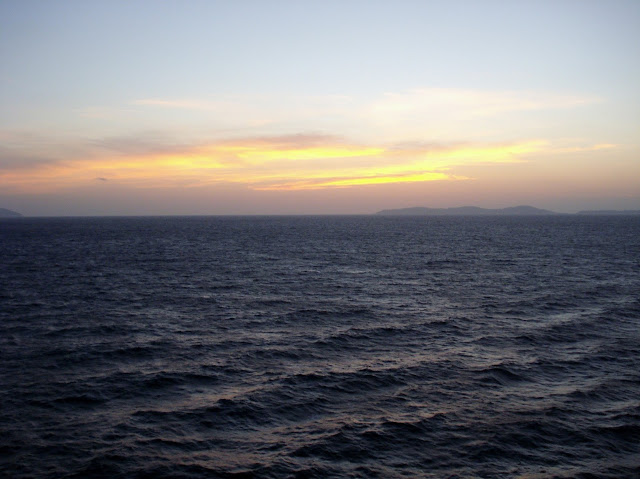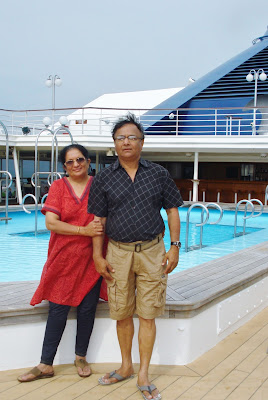Globalisation.
World is a village. How often do we hear such words and phrases! Our spirits
soar. For such phrases ultimately mean economic gain, foreign exchange to be
precise! All those wonderful essays on the components of the process that is
globalization are unwitting attempts at deluding ourselves and we keep doing
this ad nauseum. I say delusion
because, we know exactly as to where this unstoppable process is leading
to. Extinction? Of course not.
Disaster? Ummm..perhaps, yes!
The cost of runaway development in a developing country that isIndia ,
is our degrading environment, our precious natural heritage and the country’s
innate beauty. This world may be a village thank you but mother India has lost
its villages. Environment? It’s globalization, dear and we really should not
bother about it, should we? Well, this attitude is understandable coming from a
no-holds-barred businessman but, to the misfortune of us Indians, it has
percolated down to the common man, the misled, deluded villager.
Disaster? Ummm..perhaps, yes!
The cost of runaway development in a developing country that is
Now, now.
Don’t get me wrong. I am neither an environment activist nor a doomsayer! In
fact, my generation can proudly say that they are the products of real development. Today’s crowd
including young baby-boomers, fail to – rather, refuse to - understand the real
meaning of ‘enjoyment’. As a product borne out of globalization and the
resultant fast pace of development, their enjoyment means material life, fast
buck and ‘have fun’ attitude. Well! Why not? Development in the good old days
had a feeling for nature’s bounty. Without begrudging the attitude of the youth
today, can we also take care of our natural resources? The answer is an
emphatic ‘yes’. Yes, we can!
It is a
universally accepted fact the India
However, no
amount of International conferences on the hole in our ozone layer or Save
Tiger rhetoric or World Environment Days can do anything to stop homo sapiens’s vulgar encroachment on
our national, natural heritage – unless, we, in our individual capacities, feel
and empathize with nature; one regrets to say this but we just don’t.
The result:
we have forgotten to even appreciate
nature; the proof lies in the black comedy that unfolds everyday at ‘tourist’ places,
in the hordes that go to ‘points’ to watch sunsets and sunrise; the cacophony
of sounds emanating from a massive human swell is incredible. The loud
crunching of wafers for example, the drinks, the games, the percussion
instruments, the ubiquitous tape recorder (that too blaring pop music) – the
list is endless. The climax (or anti-climax, depending upon how one views it!)
comes when you hear loud, bawdy comments like,”..so what was so beautiful ?…We
wasted our time!”. The unfolding tragedy ends with terrifying and polluting
noises from departing diesel ‘package’ buses hurrying the tourist to the
coziness of ‘its’ un-natural habitat. And that too, after visiting another
temple nearby and offering prayers! This particular tribe does not ‘feel’, does
not empathise; they don’t care. And yet, they ‘enjoyed’, they had ‘fun’.
Nothing can be funnier than that!
And so, for
the umpteenth time, the sun just set, without anyone realising it, without
anyone appreciating it. If appreciation of Nature is a forgotten art, this
little event demonstrates it with tragic brutality. ‘Little’ it might be but
the implication of the drama is mighty big! If there is any learning from
it, it is this: we fail miserably, on a daily basis, to experience the whole
gamut of emotions that natural phenomena offer for us to appreciate Nature;
globalization has brainwashed us into taking Nature for granted, taking it
lightly.
The use of
capital ‘N’ is important and very necessary in today’s times. To be with Nature
and appreciate its all-encompassing beauty is to be with God, no less. One just
does not have to go to any temple, for heaven’s sake! And if you do so without
being with Nature, then, it is sheer hypocrisy; worse, you are committing a sin
that no amount of sacred waters or confessions can wash. Yet, we continue to
move on this path deluding ourselves that we are happy and contented in doing
so; and, we continue to offer prayers even as we throw the skins of the very
fruits that we offer, out on the streets.
Somewhere
along the way and in our sub-conscious is a germ of anxiety, may be
unhappiness; something is amiss; there is ‘incompleteness’ about life. Just
think about it. There is an inkling of fulfillment not happening despite our
‘happy’ life, our ‘higher’ standard of living, our overall ‘Gross’ domestic
product (economists love GDP, don’t they?).
Unknowingly,
the problem lies with the total absence of anything like an attitude towards
Nature; the irony of it all is the fact that our vedas, shashtras and puranas form the very basis of what the
rest of the world labels as ‘environment education’. We had it all these
millennia and yet, we have forgotten it; our children don’t even know about it
and we the elders care two paise for
it. Extend this aspect further and it should be explicitly clear why there are
no audiences to appreciate even our arts and culture, our dances and our music.
The reason is simple; you don’t appreciate Nature and you don’t understand our
folk and classical performing arts – for they are based on nuances drawn
straight out of the very environment which, once upon a time, we used to
inhabit - and, hold sacred.
Now, we
have only a few places left to be there and quietly,
be with God; it is in solitude even
as we are in groups that we can experience the beauty that Nature still offers,
albeit grudgingly - because we have almost destroyed it, have’nt we?
Fulfillment, happiness, rich and poor, religious and atheist – at least to me,
these words are as meaningless as a dead stump of a tree minus its once
beautiful canopy. No, surely it is not development. It is stark naked
retrogression if development is without understanding our very basis of life,
mother Nature.






















































































